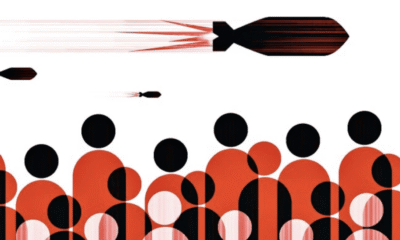
|
Getting your Trinity Audio player ready...
|
(The article was originally published in Indian Express on May 18, 2024 as a part of Dr Madhav’s column titled ‘Ram Rajya’. Views expressed are personal.)
FRANKLIN D ROOSEVELT, a celebrated US president, had once cautioned that “democ-racy cannot succeed unless those who express their choice are prepared to choose wisely”. Poll-time rhetoric from political parties and leaders is an important yardstick for laymen while casting their votes. But is that enough to “choose wisely” in the present-day milieu of competitive, and often acrimonious, political discourse?
Elections are an occasion for parties to indulge in slander and mudslinging It is not easy to separate the grain from the chaff in the cacophony of promises and protestations. While an average voter looks for what will make his life better in the commitments that parties make, it is also important that he takes an exhaustive view of the country and its future. It is in that context that every voter needs to ponder over a few aspects.
Western political theorists argued that in a democracy, “a society gets a government it deserves”. It is the quality of the society that determines the quality of its leadership, and hence philosopher Plato also warned that “one ofthe penalties forrefusing to participate in politics is that you end up being governed by your inferiors”. But it is equally important that we elect governments that enhance the quality of our national life.
The Indian wisdom proclaimed that “Raja Kaalasya Kaaranam” — the ruler is responsible for changing the times. The governments we elect shouldn’t just be the products of our fate, but also the shapers of our future. They should be able to transform our lives. The visible transformation that our nation experienced in the last decade should be analysed from that perspective.
The physical transformation in the country is quite conspicuous. But there is also a significant cultural transformation that needs greater appreciation. A culture of accountability in politics, transparency in the economy, stakeholdership in social life, autonomy in diplomacy and security and pride in civilisational and cultural identity is what new India stands for.
Politics in the country is no longer the same. The era of entitlement has been replaced by an era of accountability. Today, a mature and vigilant electorate subjects the entire political spectrum to rigorous scrutiny. Despite his larger-than-life image, the prime minister also has to toil in the scorching summers to ensure popular support for his party. So does the leadership of the opposition. Indian voters can no longer be taken for granted. It is also a nightmare to be a psephologist today.
The rise of common men and women to positions of power, at the Centre and in states, largely due to the determined efforts of the ruling party leadership, has ended the era of political oligarchies. The politics of inheritance has ended and that political space has been taken over by committed and dedicated leaders with clean public image. More and more such politicians, especially the young and talented ones, are taking the political plunge to challenge the dynasts and oligarchs. For the first time after Independence, in the current 17th Lok Sabha of 2019-24, around 400 MPs are graduates and 12 per cent, or 65 MPs are below 40 years of age. Their number in the previous 16th Lok Sabha of 2014-19 was 45, about 8 per cent. Similarly, while there were 62 women MPs in the 16th Lok Sabha, their number grew to 78 in the current one.
Prime Minister Narendra Modi has made conscious efforts in the last 10 years to encourage participatory governance at the grassroots in place of governance from the top. People were taught to consider themselves not merely the citizens but also stakeholders in the nation’s progress. Campaigns launched by his government like Swachh Bharat Abhiyan, Stand Up India, Start Up India and Innovate India were aimed at making citizens partners in the country’s rise. This culture of stakeholders hip is today a big motivating factor for millions of citizens, leading to a greater sense of “nation first” and patriotism.
The cultural shift in tems of the economy is also significant. Shedding evils like corruption, black markets and inefficiency, the Indian economy has surged ahead to scale new heights and emerged as a transparent, inclusive and citizen friendly one. It has recorded impressive growthin the last decade and emerged as the fifth-largest economy in the world, on the strength of the participation of people at the grassroots. Scams and corruption still plague some state governments like Delhi and Jharkhand, but the last 10 years saw a discernible decline in political corruption due to reduced political intervention in economic matters through measures like Direct Benefit Transfer (DBT). While there is a premium on honesty, Damocles’ sword hangs over every corrupt leader. This transparency is encouraging citizens to be compliant and rule-abiding resulting in greater tax returns and debt repayments. Substantial increases in GST collections and income tax filings indicate this.
A culture of autonomy in security and diplomatic matters is what the world encounters in India’s governance. It is not the non-alliance politics of the weak but strategic autonomy from the position of strength and confidence that India demonstrates. Quarrelsome neighbours understood the hard way after Balakot and Galwan that the Indian leadership would not only pursue diplomatic options but would also stand firm to protect every inch of its territory. At the same time, nations elsewhere too understood that India can no longer be browbeaten into any camp and it will pursue autonomous diplomatic praxis with its interest and the global good as benchmarks.
Finally, the country is also experiencing civilisational pride. More and more Indians rise above narrow social, religious and other parochial schisms to proudly wear their cultural civilisational identity on their sleeves.
A new and ambitious India is raring to become a developed nation by the time it celebrates the centenary of independence in 2047. This rise calls for stability, continuity and visionary leadership.
Hence, the need to “choose wisely”.




